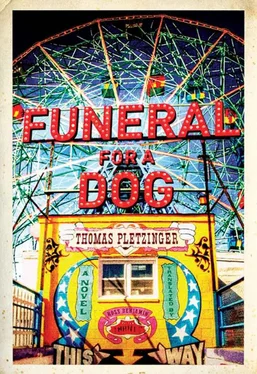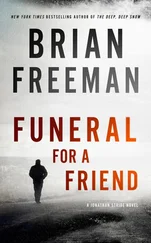Barbaresco
Stood in the hallway in front of the floor-length mirror and finished off the wine. Looked at the blood on me, the streaks next to my belly button, and from behind me Elisabeth reached into the dried blood on my cock, into her own dried blood on my cock and in my pubic hair, and said, Tomorrow in the battle think on me (my cock a blunt sword; Elisabeth and I warlike: we grind ourselves dull against each other, we strike our blades jagged). As I was about to wash off the blood in the bathroom, Elisabeth was sitting on the toilet and said, you know, Daniel Mandelkern, I’m waiting for you to decide (the bluntness of pissing women).
Yes / No / Maybe
Elisabeth was waiting for a decision, I was standing all sticky in front of the sink. She brushed her hair back behind her ears and reached for the toilet paper. Mandelkern? I must have been staring at her. Daniel? She wiped herself clean and flushed. Suddenly Elisabeth was everywhere: I saw and heard and smelled and tasted her, her blood on me, her wine in my mouth, I felt for my swollen lip, my tongue ran over the fine cut on the inside, which was still bleeding (her accidental elbow). You look like an idiot staring at a math test, said Elisabeth. Did I understand what she’d said? Yes, I said, and kept staring, no, I said, maybe (dashboardgearshift-Italy-university-Mandelkern-Hamburg-Berkeley-blood-almond-ethnology-time-Barolo-Breton-child-Renault-Anne-Laura-Eva-Hornberg-CarolinaOne-PetShopBoys-Katrin-Britta-paternoster-Kolberg-matrilineality-Geertz-Svensson-octahedron-aquarium-aquarium-couvade-Venasque-Malinowski-nostalgiatourists). One minute, I said, and spit in the bathtub. I turned my back on Elisabeth and shut the bathroom door behind me, I gathered up my scattered clothes and got the folders from the dark kitchen. Then I took the suitcase and left.
my headings, my categories
I’m actually an ethnologist. In America I’m a cultural anthropologist. I observe people, I collect conversations, I probe hierarchies, I take pictures, I sort texts, I catalogue materials, I assemble my ideas. In England I’m a social anthropologist. For almost two years I’ve been writing for Elisabeth’s editorial department. I’ve questioned and profiled people for her, I’ve taken down life stories in shorthand and summarized worldviews, I’ve fulfilled her requests. I conduct interviews and write portraits, framed by days of silence in airplanes, hotels, and bus stations. I take notes because I want to put things in order (I want to sort myself out).
Why take notes instead of going back?
I hold the pen in my hand and write, I make a note of myself (Daniel Mandelkern). I don’t let much pass without remark, I make a note of almost everything (airport terminals, newspapers, cigarette prices, black German shepherds with three legs). I write my body: diarrhea, three-and-a-half liters of wine last night, the two of us. I’m still waiting alone at the gate. The red wine didn’t agree with me (headache). Later I want to write Elisabeth’s hair, her blood on me, still later the chatter a few seats down, the two Italian women are still sitting there, my Italian is miserable, hence the word “chatter.” I make a note of my anxiety, my happiness and hesitation, I write:
Elisabeth Elisabeth Elisabeth,
the third time with distinct reproach in my handwriting. I make a note that it doesn’t do you any good to be married to your boss, that it’s wrong to work for your wife, that a child won’t solve our problem. That it can’t go on like this, Elisabeth! With a paper cup of coffee and my first cigarette in months, I’m sitting in the nonsmoking waiting area of the Hamburg Airport. I write “nonsmoking waiting area” even though I’m now smoking, even though no one besides me is waiting (so much for truth).
my thin skin
Why a bus now, of all things? But I can’t get off and walk the few meters to the airplane (departure begins with the hiss of the hydraulic doors). The accordion bus only half full, with colorful summer shirts, a few carry-on travelers and frequent fliers, most of them on the phone. I have to put up with the rocking (in the mirror over the bus door: red wine residue on my lips). The wine didn’t agree with me, the wine was just too much wine. I wonder if I should call Elisabeth. I’d wake her, and then I wouldn’t be the only one feeling wretched. She’ll want to go on sleeping despite her headache (our last, half-empty bottle next to the red digits of the alarm clock). I’d have to explain to her why I left. I’d have to talk about decisions and wanting a child and life plans. I’d have to tell Elisabeth I’m having doubts about marriage (about our marriage). I might utter the word “divorce,” I might quote my mother: it’s not what you say but how you say it. I don’t call, I buried my telephone in the suitcase (such thoughts, such strategies, such cruelties).
Suomi
A few seats in front of me on the bus, a woman with a child. It’s not the green of her tank top that makes me notice her. She lights a cigarette. The woman is very small, her back slightly bent, the vertebrae on the nape of her neck clearly visible, short blonde hair held back by a tacky hair band (pink roses on a black background), her flowered skirt a little too short (her feet are resting on the wheel hump). I see her from behind, I have a hard time imagining a face to go with this back and this hair band. She has no baggage, in her small hand she’s holding only a pack of cigarettes and a passport (Suomi — Finland). She’s smoking even though it’s prohibited (like me). The boy clutches a small, light-blue backpack on his lap. Three, maybe five years old, I can’t tell the ages of children (his light hair — her light hair). Hard to imagine: her body as the body of a mother. Elisabeth is longer-limbed than this woman (Elisabeth with the skin of a redhead, her age is visible only in the corners of her eyes and around the caesarean scar below her belly button). Nonsmoking bus! cries a man, but the woman ignores him and turns around to me as if I were the one who had admonished her. She smiles at me (obstinate and condescending, Elisabeth is a master of this exact same expression). The boy whispers something in her ear. The Nordic sky outside the windows hangs over the pines (airfield, Niendorf), the bright asphalt, and the engines. The woman turns back around and strokes the boy’s hair, gives him the passport and the pack of cigarettes, he stows them in his backpack (she’s careful not to blow smoke in his direction). The bus leans into one last turn and stops by a small plane. I’m going to take a walk around the airplane now, Mama, says the boy. He takes the backpack and climbs carefully off the bus. His eyes scrutinize his mother behind the bus window.
She stays where she is
until the driver finally asks her to get off, and she stamps out the cigarette on the airfield with her heel as pointedly as if the driver were the one in the wrong (dark-green Converse). The boy carries his small backpack up the stairs (one step at a time, his legs are too short), stops for a moment in front of the oval door and takes a big step over the threshold without looking back. Only then does she follow him, and I her.
Flight LH 3920
I ended up getting a window seat, and the airplane turns me away from the terminal. I notice a gray heron standing on the other side of the airfield, it soars into the air and disappears in the bright fog. The business travelers around me are talking on their phones, a crash caused by the use of electronic devices on board is now briefly my only worry. I don’t have to be warned, even though I don’t understand what telephones and computers have to do with the navigation of an airplane (I buried my telephone in my luggage). In the row in front of me, the woman in the green tank top, next to her the blond boy is standing on the seat and looking at me (light blue eyes, no resemblance in their faces). The woman climbs up on the seat too and takes a book out of the backpack in the overhead compartment (her somewhat too-round face and her tired eyes).
Читать дальше












